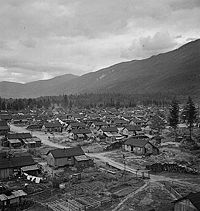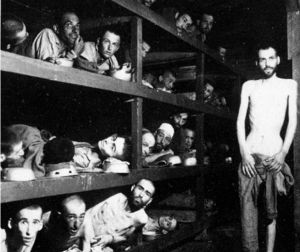Concentration camp
- This page is about the usage and history of the terms concentration camp, internment camp and internment. For a listing of individual camps, please see List of concentration and internment camps. For German concentration camps during World War II, see Nazi concentration camps'.

"Internment" is the imprisonment or confinement of people, commonly in large groups, without trial. It also refers to the practice of neutral countries in time of war in detaining belligerent armed forces and equipment in their territories under the Second Hague Convention.
Early civilizations such as the Assyrians used forced resettlement of populations as a means of controlling territory, but it was not until much later that records exist of groups of civilians being concentrated into large prison camps. The most notorious of such prison camps were the Nazi concentration camps.
Internment camps
An internment camp is a large detention center created for political opponents, enemy aliens, specific ethnic or religious groups, civilians of a critical war-zone, or other groups of people, usually during a war. The term is used for facilities whose inmates are selected according to some specific criteria, rather than individuals who are incarcerated after due process of law fairly applied by a judiciary.
As a result of mistreatment of civilans interned during recent conflicts, the Fourth Geneva Convention was established in 1949 to provide for the protection of civilians during times of war "in the hands" of an enemy and under any occupation by a foreign power. It has been ratified by 194 nations. Prisoner-of-war camps are internment camps intended specifically for holding members of an enemy's armed forces as defined in the Third Geneva Convention, and the treatment of whom is specifed in that Convention.
Concentration camp
The Oxford English Dictionary, 2nd ed. defines concentration camp as
- a camp where non-combatants of a district are accommodated, such as those instituted by Lord Kitchener during the South African war of 1899-1902; one for the internment of political prisoners, foreign nationals, etc., esp. as organized by the Nazi regime in Germany before and during the war of 1939-45
The English term "concentration camp" was first used to describe camps operated by the British in South Africa during the 1899-1902 Second Boer War. Allegedly conceived as a form of humanitarian aid to the families whose farms had been destroyed in the fighting, the camps were used to confine and control large numbers of civilians as part of a Scorched Earth tactic. A report after the war stated that 27,927 Boers (of whom 22,074 were children under 16) and 14,154 black Africans died as a result of diseases developed due to overcrowding, inadequate diets and poor sanitation in the camps. In all, about 25% of the Boer inmates and 12% of the black African inmates died. The term "concentration camp" was coined at this time to signify the "concentration" of a large number of people in one place, and was used to describe both the camps in South Africa (1899-1902) and those established by the Spanish to support a similar anti-insurgency campaign in Cuba (circa 1895-1898 [1]), although at least some Spanish sources disagree with the comparison [2].
Use of the word concentration comes from the idea of concentrating a group of people who are in some way undesirable in one place, where they can be watched by those who incarcerated them. For example, in a time of insurgency, potential supporters of the insurgents are placed where they cannot provide them with supplies or information.
The term concentration camp lost some of its original meaning after Nazi concentration camps were discovered, and has ever since been understood to refer to a place of mistreatment, starvation, forced labour, and murder. The expression since then has only been used in this extremely pejorative sense; no government or organization has used it to describe its own facilities, using instead terms such as internment camp, resettlement camp, detention facility, etc, regardless of the actual circumstances of the camp, which can vary a great deal.
In the 20th century the arbitrary internment of civilians by the state became more common and reached a climax with Nazi concentration camps and the practice of genocide in Nazi extermination camps, and with the Gulag system of forced labor camps of the Soviet Union. As a result of this trend, the term "concentration camp" carries many of the connotations of "extermination camp" and is sometimes used synonymously. A concentration camp, however, is not by definition a death-camp. For example, many of the slave labor camps were used as cheap or free sources of factory labor for the manufacture of war materials and other goods.
Since the nature of Germany's so-called "concentration camps" (Konzentrationslager, abbreviated to KL, or Lager (camp), later KZ) became known, the term is sometimes used as propaganda, to imply that a camp is designed to exterminate, rather than merely to concentrate, its inmates.
Credits
New World Encyclopedia writers and editors rewrote and completed the Wikipedia article in accordance with New World Encyclopedia standards. This article abides by terms of the Creative Commons CC-by-sa 3.0 License (CC-by-sa), which may be used and disseminated with proper attribution. Credit is due under the terms of this license that can reference both the New World Encyclopedia contributors and the selfless volunteer contributors of the Wikimedia Foundation. To cite this article click here for a list of acceptable citing formats.The history of earlier contributions by wikipedians is accessible to researchers here:
The history of this article since it was imported to New World Encyclopedia:
Note: Some restrictions may apply to use of individual images which are separately licensed.
